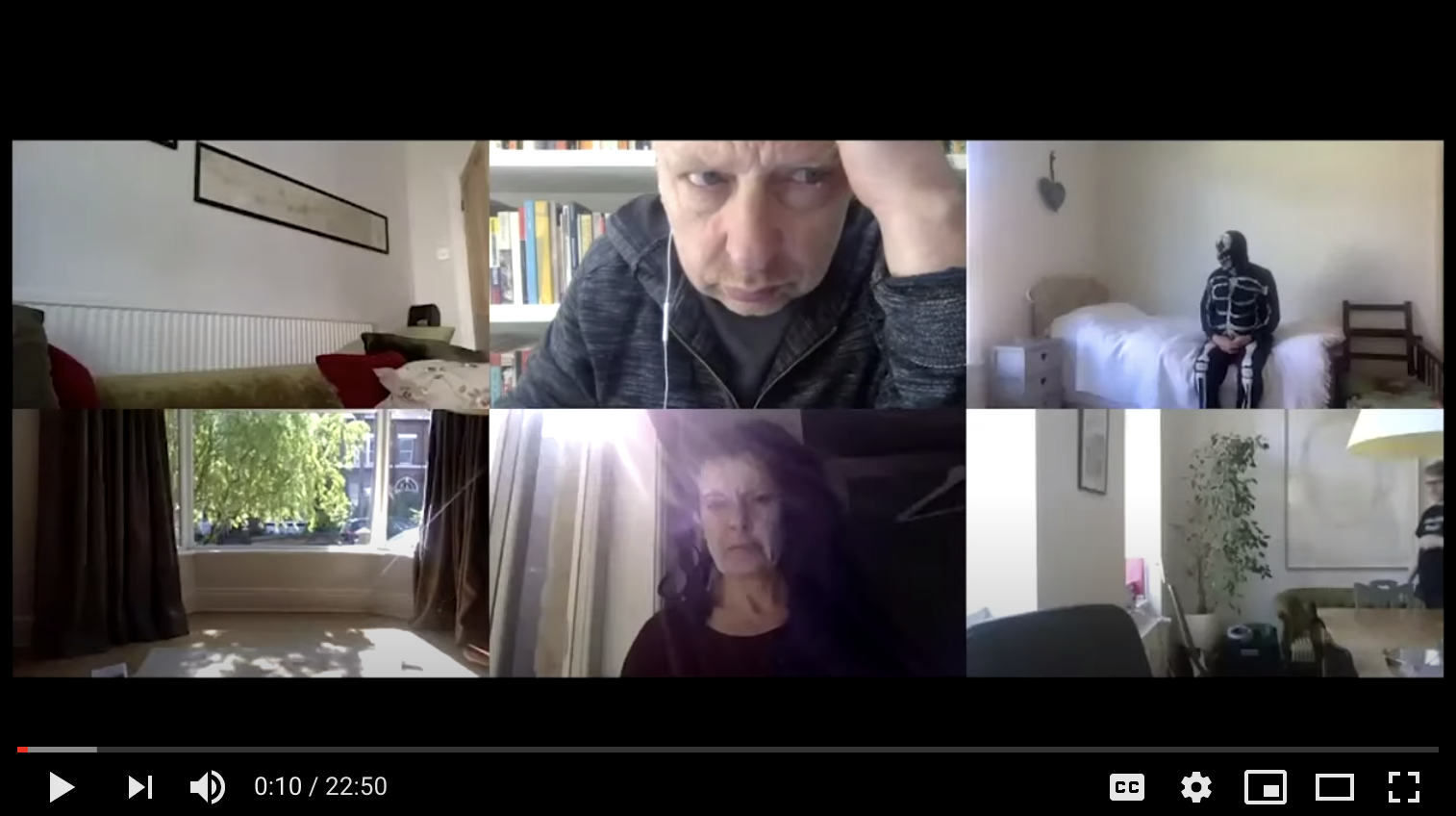Forced Entertainment’s three-part End Meeting For All makes clear how rapidly digital theatre is developing in the age of COVID-19. With the prospect of theatres reopening in the near future looking uncertain at best, the development of a new form, with an experimental energy all its own, is a rare bright spot on the theatrical landscape.
If Richard Nelson’s What Do We Need to Talk About, instantly canonized during this pandemic as the birth of Zoom-native drama, inaugurated the form in a relentless realist mode, End Meeting For All provides the absurdist, Beckettian alternative. Recorded in single live takes, the three twenty-five-minute segments bring together six performers improvising at a distance—from Sheffield, London, and Berlin. From its witty title on, End Meeting, first broadcast in April and May 2020, depends on the audience’s previous rapid assimilation, over long weeks of lockdown, of the unwritten Rules of Zoom, which the piece then blithely proceeds to dismantle. As director Tim Etchells notes on the Forced Entertainment website, “I realised we were slowly starting to understand the Zoom grid as a kind of stage – a space we shared but in which we were nonetheless both connected and disconnected.”
Beyond its intrinsic interest, End Meeting reflects on our newest habits of viewership and communication, confronting us with how passively we have adapted. Why do we face the camera—and remain at a manageable distance from it—in suitable lighting? Why not cover it up with our hands, or use it to put on make-up? Why do we only present ourselves in our naked individuality (though decently clad, at least from the waist up) and not in funny wigs or masks? However sad we are, how much privilege is there in simply being able to remain inside?
Beyond its intrinsic interest, End Meeting reflects on our newest habits of viewership and communication, confronting us with how passively we have adapted.
In fits and starts, End Meeting For All stages the tentative creation of a theatrical work, occasionally set aside for other desultory projects that its characters haphazardly attempt. As a play-within-a-play, it chronicles the challenges of its own new form, mobilizing them to consider the larger difficulties of existing in a time of pandemic. The six performers, each in their own Zoom window, are more or less engaged in the process. In the first installment, the erstwhile protagonist, Claire (Claire Marshall), in an outsize grey wig, announces: “The reason that I am wearing this wig is because I am pretending that I have been in quarantine for a really, really long time.” As director, Tim occasionally feeds Claire her lines. Their back-and-forth about the piece they are trying to make constitutes most of the action, such as it is; its impossibility makes the achieved Zoom drama a little like the Godot who never arrives.
Meanwhile, the others process their sadness and alienation in various ways, from intense exchanges with their fellow actors to complete isolation. One tries to communicate via handwritten signs (“Can anyone see me?”) and eventually retreats into a pantomime skeleton costume, complete with mask. Others block the camera with various props and body parts, simultaneously avoiding our gaze and deliberately framing it. As they experiment with colors and patterns across the windows, End Meeting suddenly becomes as much video art as theatre. With Zoom increasingly penetrating our pandemic existence, the disappearance of the actors’ faces from their respective windows suggests both a plea for privacy and a sobering reminder of death.



Comments
The article is just the start of the conversation—we want to know what you think about this subject, too! HowlRound is a space for knowledge-sharing, and we welcome spirited, thoughtful, and on-topic dialogue. Find our full comments policy here